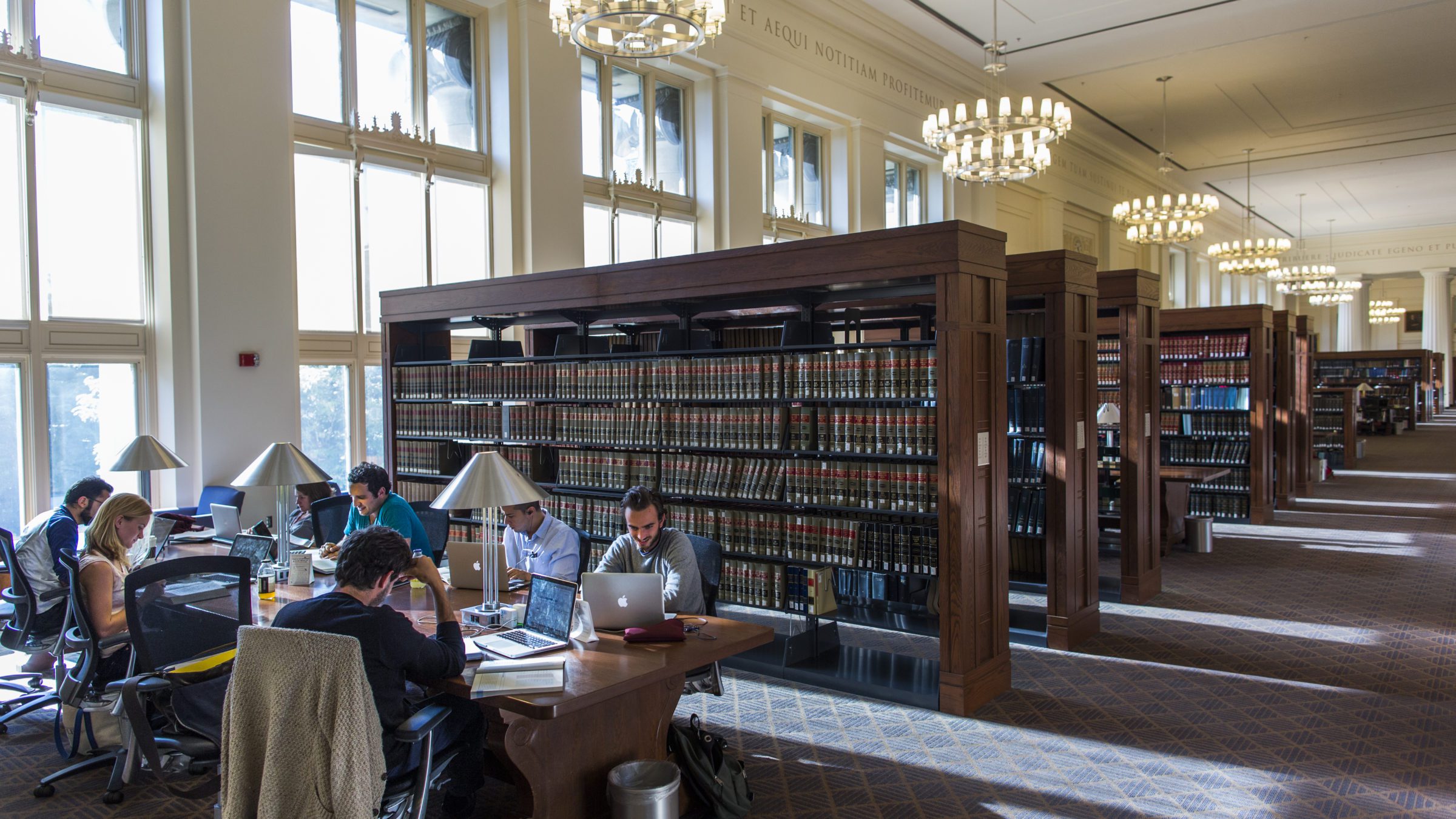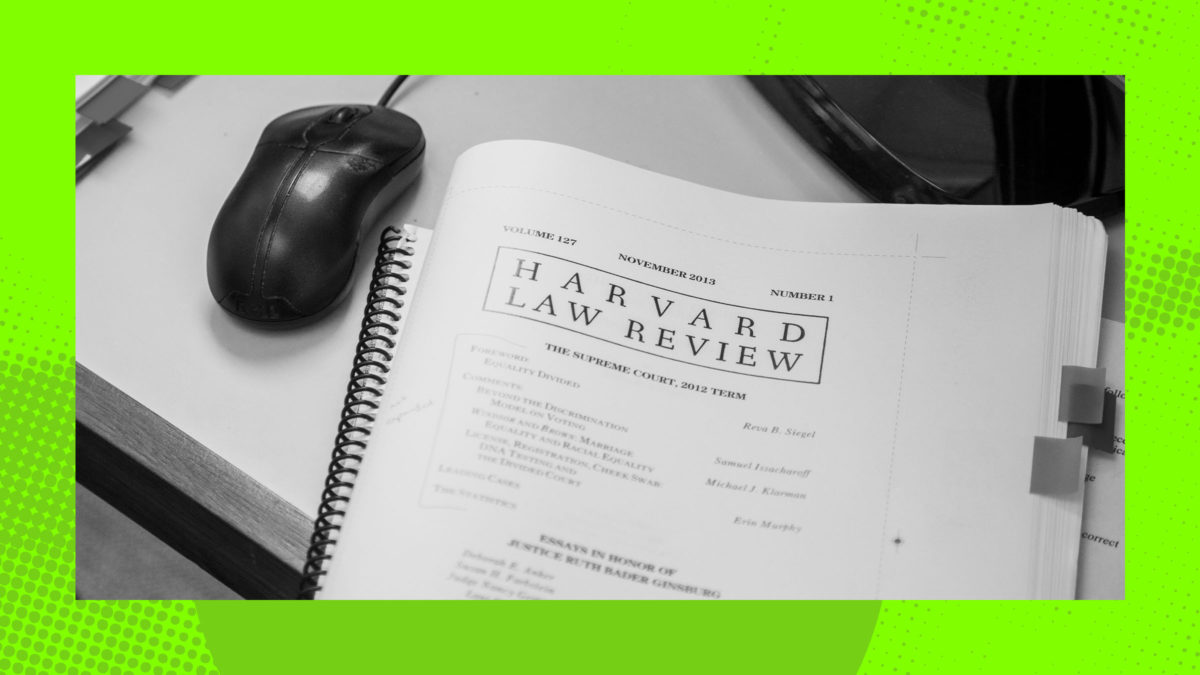As a federal judiciary dominated by hundreds of right-wing Trump appointees works tirelessly to reshape the law in the image of a gun-bearing, vaccine-refusing American Jesus, conservative legal academics are hard at work churning out law review articles and blogs to find new conservative legal gospel. They announce new doctrines, hash out how to advance Republican dogma in the legal system, and otherwise debate how to cement conservative rule forever, democratically or not (mostly not).
Those debates often have major consequences outside of conservative circles. For instance, after the Warren Court held that the Constitution prohibited segregation and required some basic civil rights for criminal defendants in the mid-1960s, outraged conservatives needed something to try to reverse those decisions. It was conservative legal academics who came up with the idea of interpreting the Constitution as its drafters in the 1780s—slaveholders and landlords and wealthy merchants who had just financed a revolution rather than pay taxes—would have meant it. That idea, originalism, became a litmus test that the Republican Party ruthlessly enforced for all its judicial nominees, and now commands a majority on the Supreme Court.
One of the most recent debates started in the run-up to the 2020 election, as conservative legal academics sought to reckon with the four Trump years. Even though Trump had seated hundreds of federal judges and passed a huge tax cut for the rich, he hadn’t been able to repeal the Affordable Care Act or build the wall. The Supreme Court wasn’t always playing ball, either: It didn’t overturn Roe and it didn’t give Trump an affirmative green light to exclude undocumented people from the census. Even worse, the liberals were about to storm back into power and try to undo it all.
One Harvard Law School professor, Adrian Vermeule, was particularly concerned about what he saw as the weakness of originalism: Liberals had figured out ways around it. They could convince moderate Republican justices to protect gay rights, or use originalist frameworks to argue that the Framers never intended to protect an individual’s right to bear arms. The barely-disguised goal of originalism was to advance conservative policy preferences by framing them as more or less required by the Constitution itself. If originalism couldn’t do that, then it needed to go.

Students at Harvard Law School maybe reading Adrian Vermeule, maybe not, who knows (Photo by Brooks Kraft LLC/Corbis via Getty Images)
So Vermeule tried to divine a new conservative jurisprudence that could both advance reactionary readings of the Constitution and lay the groundwork for the next Republican presidency to really own the libs. In 2020, he unveiled his answer: “common good constitutionalism.” Vermeule’s big idea is that any law, whether a constitutional rule or statute, must be reasonable and designed to advance “the common good.” And according to Vermeule, “the common good” is best advanced by following his conception of “natural law” and the “classical legal tradition,” “a millennia-old legal framework, worked out over time by a succession of the greatest lawyers in Europe, the British Isles, and the Americas, and absolutely central to Western law as a whole.”
Setting aside this definition’s narrow focus on Western culture and the fact that it doesn’t actually define anything, there is an obvious problem with this definition of the “common good.” For most of the last two thousand years, the “greatest lawyers” in Europe were not working in countries that would score highly on modern state-of-the-art democracy indices. Philosophers working at the pleasure of a local prince or king were able to write about how an enlightened ruler must follow the principles of natural law so long as they didn’t step on any of the toes of the people in charge. We can take the submissions of “the greatest lawyers in Europe” with a few grains of salt.
But it’s those sources on which Vermeule relies to vaguely define the “common good.” Although the bulk of his work to date carefully avoids describing how common good constitutionalism would handle specific issues, Vermeule’s critics and his supporters both intuitively understand what he means. He means importing reactionary policies into a conception of natural law that’s superior to any law, even the Constitution, if the law conflicts with those policies. In a recently-published article in the Harvard Journal of Law and Public Policy, Vermeule makes the upshot clear when he finally talks about how originalism has failed: It allows “progressive originalists” to read the Constitution “to encompass abortion,” and “libertarian originalists” to read the Constitution “to encompass same-sex marriage.” He’s outraged that progressive scholars can twist originalism to argue that the Constitution’s original meaning supports ideas that “encompass any moral novelties the legal professoriate can dream up.”
When he calls gay rights a “moral novelty,” that gives the whole game away. “In appropriate cases,” Vermeule writes, judges should look “to general principles of law” to understand statutes and the Constitution. Under his theory, legislatures should be assumed to have considered natural law and the “common good” when they enacted laws; if a law or a constitutional provision “conflicts with powerful principles and background norms of the legal system,” then it should be ignored. And it’s conservative legal academics who would decide just what those powerful principles and background norms should be. A Supreme Court that buys into Vermeule’s theory would have a ready-made reason to do anything from banning gay marriage to allowing public schools to require students to pray. Common good constitutionalism is the ultimate “heads I win, tails you lose” jurisprudence for conservatives.
Conservatives dominate the federal judiciary today because they’ve long made the stakes of each judicial nomination very clear, and hand-picked nominees to follow their latest dogmas.
In effect, Vermeule’s common good constitutionalism is a repackaged version of legal realism—the idea that judges make decisions primarily for social and political reasons, not for formal legal reasons—but advanced from the right, and cloaked in high-minded language about history and norms. This would be a powerful tool in the toolkit of Republican judges, who are already stretching their wings under Biden by threatening to overturn Roe v. Wade and upholding gerrymandered electoral maps without even putting out a written decision. If this theory gains traction among the next generation of Republican lawyers, lawmakers, and judicial nominees, progressives could find themselves sorely outgunned.
And it certainly appears that Vermeule’s ideology is gaining steam in right-wing legal circles. He and his fellow travelers have started multiple blogs to push their ideas and debate more traditional Federalist Society originalist types. In his Harvard Journal of Law and Public Policy article, he touted “a series of works, many by younger scholars,” that has purportedly “started to draw upon the common good framework.” (He only cites several posts published on one of his own blogs, so perhaps take this assertion with another grain of salt.) He’s even been asked to attend a conference with several other rising reactionary stars to discuss his new theory. It seems like they’re only selling a few hundred tickets, so interested readers should act fast if they don’t want to miss a riveting evening with perpetually damp former author J.D. Vance and full-time culture warrior Josh Hammer.
Unfortunately, as funny as the idea of an hour-long conversation between the author of Hillbilly Elegy and the author of dozens of TownHall.com blog posts may be, these kinds of debates may not be a laughing matter. Conservatives dominate the federal judiciary today because they’ve long made the stakes of each judicial nomination very clear, and hand-picked their nominees to follow their latest dogmas. The next batch of Republican judges may sound a lot like Adrian Vermeule today. If that happens, overturning Roe may just be the beginning.

